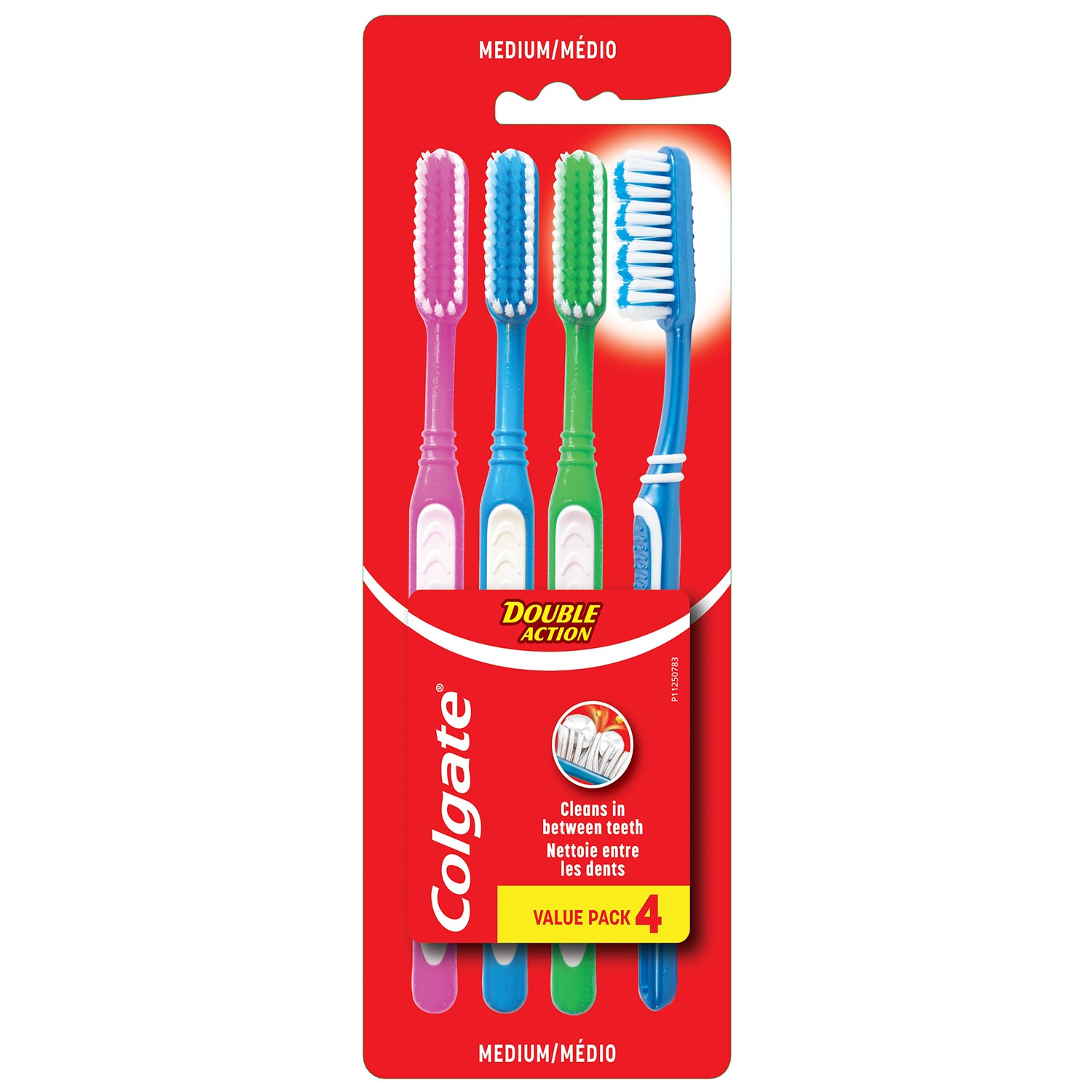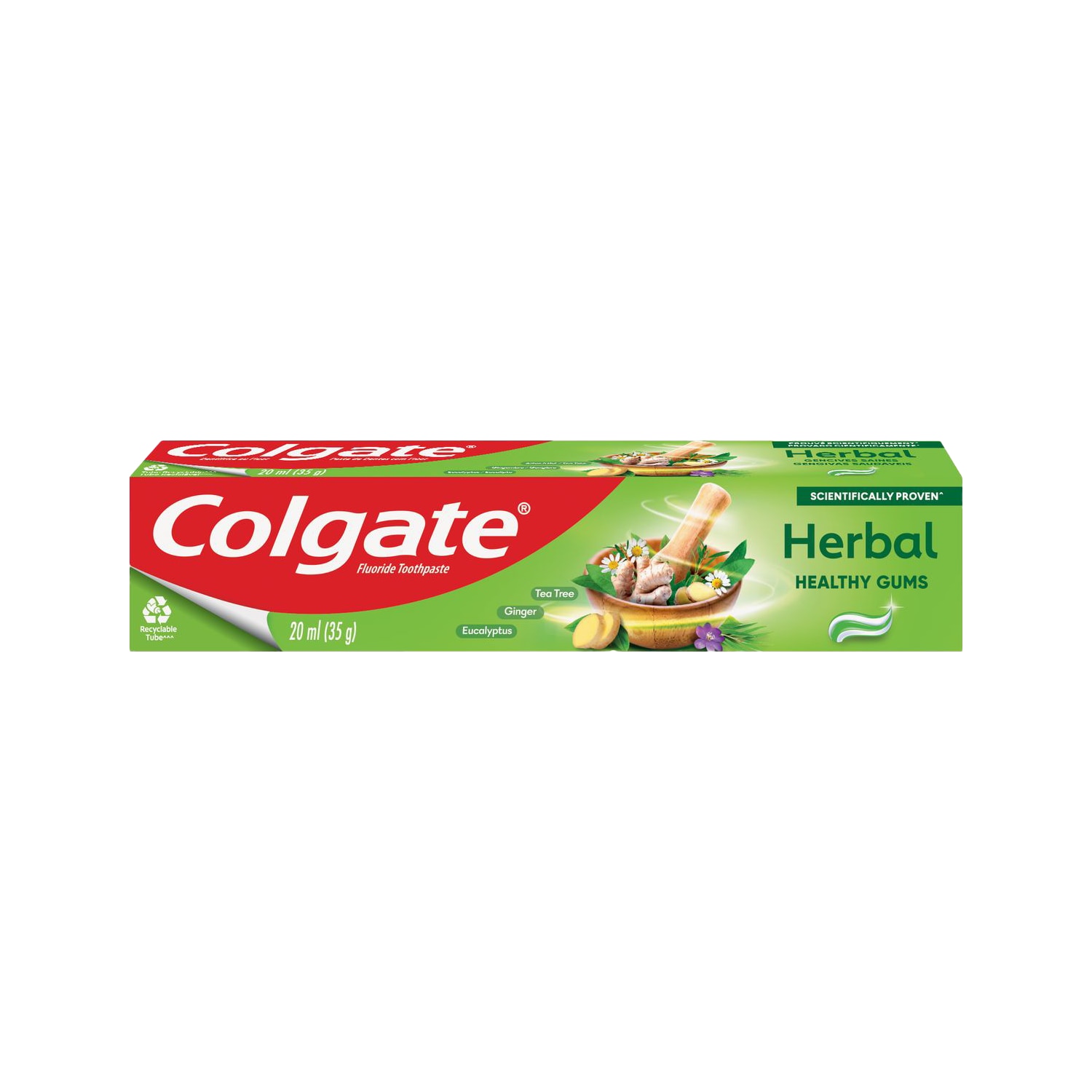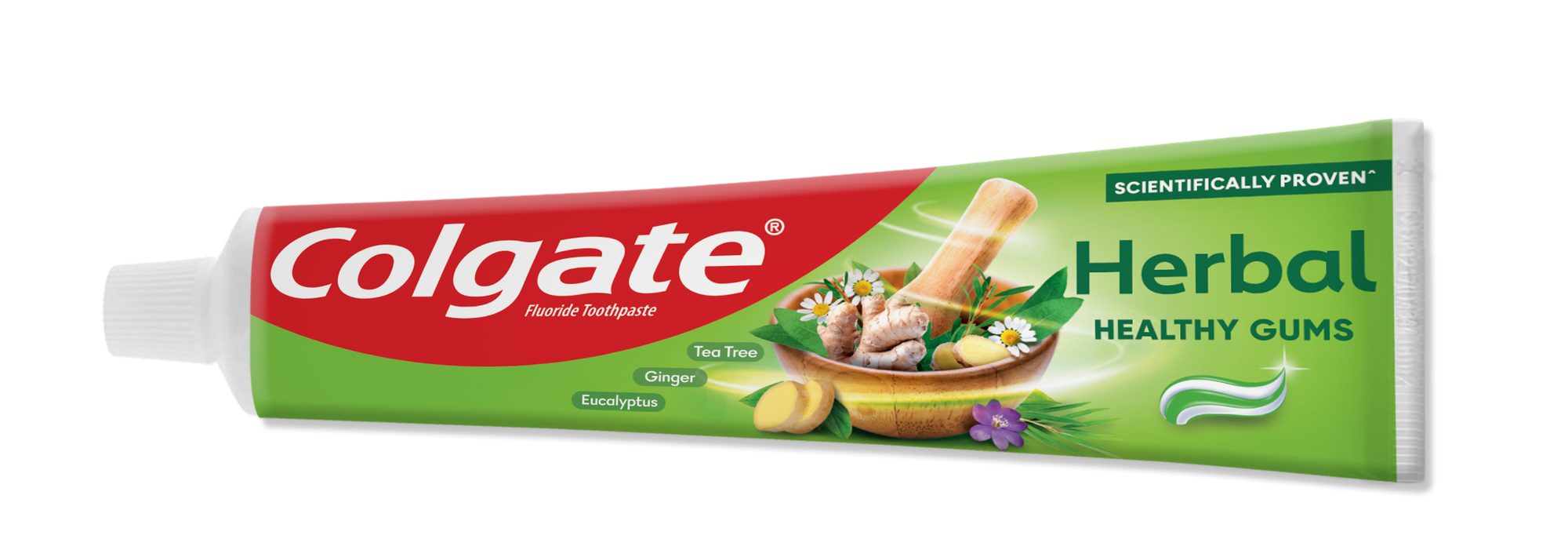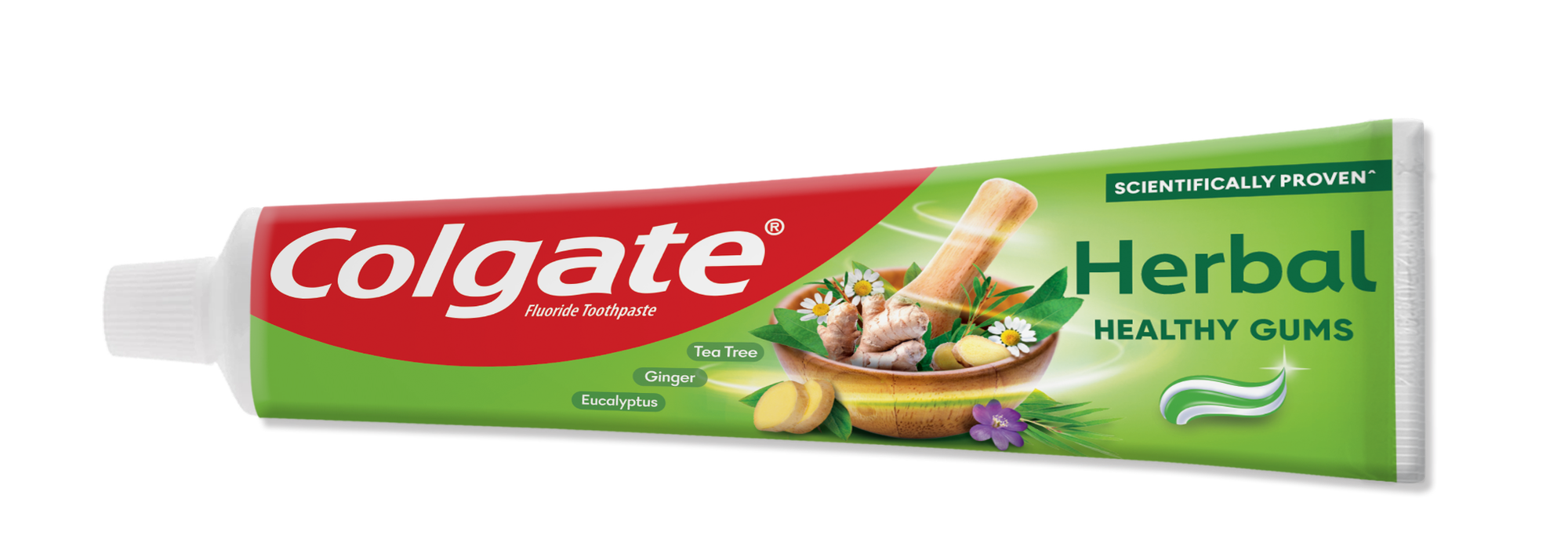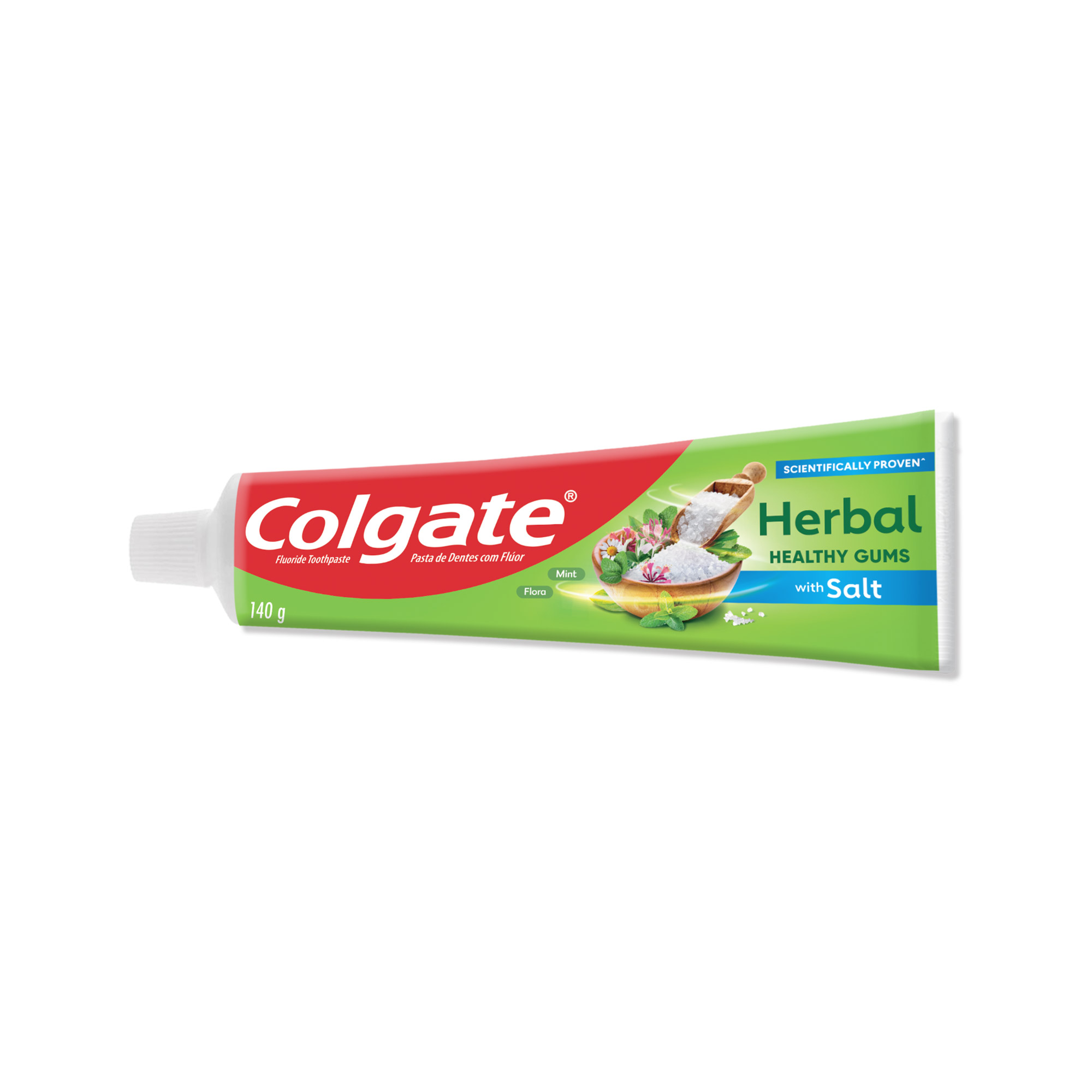- Colgate® | Toothpaste, Toothbrushes & Oral Care Resources
- Colgate Herbal
Harnessing the power of nature for HEALTHY GUMS for the whole family!
Colgate® Herbal
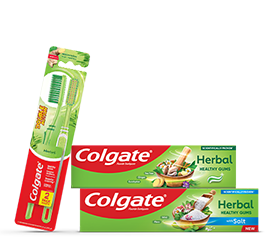
Harnessing the power of nature for HEALTHY GUMS for the whole family!
Colgate® Herbal

Colgate® Herbal combines the power of Eucalyptus, Ginger, Tea Tree and other natural ingredients with Colgate® Science to care for your family’s oral health. It is scientifically proven to keep your gums healthy and teeth strong giving a bright Colgate® Smile for the whole family!


Ginger
A potent natural remedy for oral health,containing gingerol, antibacterial and anti-inflammatory benefits. Ginger can help alleviate gingivitis and reduce gum swelling.


Eucalyptus
Known for its antimicrobial and anti-inflammatory properties, it also can help to reduce bad breath by killing bacteria that cause odour. Eucalyptus oil can soothe gum inflammation and promote healthy gums.


Tea Tree Oil
A powerful natural antiseptic that can effectively fight bacteria and fungi in the mouth. It can help prevent gum infections, gingivitis, and bad breath.


+ Colgate® Science
Combining these amazing natural ingredients with Colgate®'s superior oral care science, ensures healthy gums and strong teeth for your whole family!
- Toothpaste
Colgate® Herbal is on a mission!
It's kind of a BIG THING!
-
Gum disease happens when there is a build up of germs (plaque) in the mouth, specifically on your teeth and gums. It can be seen as swelling,redness, irritation and even bleeding of your gums. Bad breath also commonly features when gum disease is present.
Plaque is a sticky soft layer that forms around where the teeth meet the gums. It has germs and food debris and starts to form a few minutes after we brushed.When plaque is not removed everyday with good brushing habits, it builds up and causes mild gum disease known as gingivitis. When the plaque is not removed it can harden and form tartar, both of these can cause gingivitis.
If gingivitis is left untreated it can progress to severe gum disease known as periodontitis. Periodontitis has many negative effects for the mouth and body and affects 19% of adults worldwide. According to WHO, 20% of Kenyans 15 years and above suffer from severe periodontal disease.
Periodontitis can cause teeth to become loose or fall out. Therefore it is very important to treat gingivitis as soon as you have symptoms.
Causes:
Plaque build due to poor oral hygiene
Tobacco use
Stress and poor diet
Symptoms:
Swelling and red gums
Constant bad breath
Bleeding gums when brushing
Sensitive or painful gums
Prevention:
Brush twice a day with a toothbrush in the correct way
Use floss daily
Consider using a mouthwash for extra protection
Consult your dentist
*This article has been reviewed by an oral health medical professional. This information is for educational purposes only. This content is not intended to be a substitute for professional medical advice, diagnosis or treatment. Always seek the advice of your dentist, physician or other qualified healthcare provider.
-
Nature's Oral Health Trio: Eucalyptus, Ginger, and Tea Tree
Eucalyptus, ginger, and tea tree have long been revered for their medicinal properties, including their benefits for oral health.
Eucalyptus is known for its antimicrobial and anti-inflammatory properties. It can help reduce bad breath by killing bacteria that cause odour. Additionally, eucalyptus oil can soothe gum inflammation and promote healthy gums.
Ginger is another potent natural remedy for oral health. It contains gingerol, a compound with antibacterial and anti-inflammatory properties. Ginger can help alleviate gingivitis and reduce gum swelling. It can also help soothe canker sores and promote faster healing.
Tea tree oil is a powerful natural antiseptic that can effectively fight bacteria and fungi in the mouth. It can help prevent gum infections, gingivitis, and bad breath.
Incorporating eucalyptus, ginger, and tea tree into your oral hygiene routine can provide numerous benefits for your dental health.
This article has been reviewed by an oral health medical professional. This information is for educational purposes only. This content is not intended to be a substitute for professional medical advice, diagnosis or treatment. Always seek the advice of your dentist, physician or other qualified healthcare provider. This article was written using AI.
Sources:
https://dyerdentalcareep.com/5-home-remedies-for-gum-disease-and-tooth-infection/
https://www.webmd.com/vitamins-and-supplements/ss/slideshow-eucalyptus-oil-benefits-and-uses
https://www.healthline.com/nutrition/11-proven-benefits-of-ginger
https://naturopathiccontinuingeducation.com/2019/01/18/popular-herbal-remedies-that-work-naturopathic-ce/
-
Many people have heard that milk is good for their bones and carrots are good for their eyes. These nutrition recommendations are well known, but you may not know which foods, if any, are good for your gums. Here's what current nutrition research says about the best foods for gum health.
Nutrients That May Benefit Gum Health
At this time, the research linking specific foods to better gum health is limited. However, scientists have drawn a number of conclusions from the research that is available regarding some nutrients that may benefit gum health.
Vitamin C
Foods that contain vitamin C may reduce gum inflammation, according to an article published in the Nutrients Journal. People who are deficient in this important vitamin may get scurvy — a disease that causes inflamed, bleeding gums. The US National Institutes of Health notes that all fruits and vegetables contain vitamin C, but some of the best sources include citrus fruits, berries, and leafy greens.
Vitamin B12
The Nutrients article also suggests that vitamin B12 may support gum health. People who are deficient in this vitamin may have bleeding gums, and some studies have found a link between low vitamin B12 levels and severe gum disease. The American Academy of Nutrition and Dietetics explains that animal products, such as milk, eggs, and meat, are good sources of B12. In addition, some breads, pastas, and cereals are fortified with B12.
Omega-3 Fatty Acids
A diet that's rich in omega-3 fatty acids may play a role in keeping your gums healthy, too. As a study published in the BMC Oral Health Journal reports, there is evidence showing that omega-3 fatty acids help to regulate inflammation in the gum tissues. Some good sources of omega-3 fatty acids include flaxseed oil and fish.
Foods Associated With Poor Gum Health
While some foods have been linked to good gum health, others have the opposite effect. The American Dental Association explains that poor nutrition can worsen the conditions of your gums. In particular, a diet high in refined carbohydrates may be connected to gum inflammation, concludes the BMC Oral Health study. Refined carbohydrates include foods such as white bread, white rice, and potato chips, explains the Cleveland Clinic. In general, as outlined by the Nutrients article, a high-sugar diet encourages plaque formation and puts you at higher risk for various dental problems.
Next time you take a trip to the grocery store, try adding some foods rich in vitamin C, vitamin B12 and omega-3 fatty acids to your cart. By keeping up with a healthy, well-balanced diet, you’ll not only be doing your gums a favour, but your overall body health too. To learn more about the best foods for gum health, talk to your medical or dental professional.
This article has been reviewed by an oral health medical professional. This information is for educational purposes only. This content is not intended to be a substitute for professional medical advice, diagnosis or treatment. Always seek the advice of your dentist, physician or other qualified healthcare provider. This article was summarised using AI.
-
Pregnancy is a miraculous event that can affect the entire body including oral health. Research shows that pregnant women with periodontal disease may be at increased risk of adverse pregnancy outcomes like preterm labour and low birth weight babies. Maintaining proper oral hygiene is therefore essential during this period.
The hormonal changes during pregnancy can make the expectant mother more susceptible to gingivitis and cavities but also for more severe gum disease like periodontitis. Pregnant women may experience exacerbated symptoms like gum bleeding and pocket formation between teeth and gums. Prompt dental evaluation is crucial if these symptoms occur.
Treating periodontal disease while pregnant with non-surgical treatments for gum disease are safe for pregnant women. Maintain good oral hygiene by brushing twice a day and flossing once a day, and dental check-ups at least once a year. It is good to visit a dentist if you fall pregnant to help you optimise the health of your gums and teeth.
Ensuring good periodontal health supports both maternal well-being and a healthy pregnancy.
This article has been reviewed by an oral health medical professional. This information is for educational purposes only. This content is not intended to be a substitute for professional medical advice, diagnosis or treatment. Always seek the advice of your dentist, physician or other qualified healthcare provider. This article was summarised using AI.
Sources:
Centres for Disease Control and Prevention. Talking to pregnant women about oral health. https://www.cdc.gov/oral-health/hcp/conversation-tips/talking-to-pregnant-women-about-oral-health.html#:~:text=Pregnancy%20and%20Oral%20Health&text=About%2060%25%20to%2075%25%20of,by%20changing%20hormones%20during%20pregnancy
World Dental Federation. Perinatal and infant oral health care. https://www.fdiworlddental.org/perinatal-and-infant-oral-health-care
Periodontal Medicine: Impact of Periodontal Status on Pregnancy Outcomes. https://doi.org/10.5772/intechopen.96147
-
Research is ongoing to determine if there is a definitive link between gum disease and heart disease. Some studies suggest that chronic gum disease (periodontal disease) — caused by a bacterial infection — may contribute to heart disease. According to the Cleveland Clinic, bacteria causing gum disease can enter the bloodstream, raising a C-reactive protein indicating inflammation in blood vessels, potentially increasing the risk of heart disease. Harvard Medical School states that people with gum disease may have a two to three times greater risk of having a heart attack or other cardiovascular problems, although healthy gums do not eliminate heart disease risk, nor do gum issues guarantee heart problems. (Therefore there is an association between gum disease and cardiovascular disease but no direct causal relationship).
The relationship includes:
- Higher heart disease risk with periodontitis
- Increased bacterial infection risk in the bloodstream affecting heart valves with poor oral health
- Importance of good oral care for those with artificial heart valves
- Connection between tooth loss patterns and coronary artery disease
- Elevated heart disease risk for diabetics, emphasising the need for diligent oral care
For those with heart disease undergoing dental procedures, it is critical to:
- Inform the dental professional of any heart conditions and medications
- Consult your physician treating the heart disease regarding any prophylaxis needed
For maintaining oral health:
- Brushing twice a day,
- Daily flossing,
- Visit your dentist regularly, meaning at least one a year for a checkup and cleaning, but more often if you have active gum disease or tooth problems.
- Consider using an antiseptic mouthwash if you have gum disease to help fight the infection.
- Good oral health practices can positively influence heart health.
This article has been reviewed by an oral health medical professional. This information is for educational purposes only. This content is not intended to be a substitute for professional medical advice, diagnosis or treatment. Always seek the advice of your dentist, physician or other qualified healthcare provider. This article was summarised using AI.
*Please note that the articles provided on this website do not constitute medical advice.

